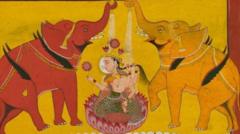**This article explores the political turmoil, civil liberties suspension, and societal impacts during the Emergency declared by Indira Gandhi in 1975, reflecting on the fragility of democracy.**
**The Shadow of Emergency: Revisiting India’s Authoritarian Interlude**

**The Shadow of Emergency: Revisiting India’s Authoritarian Interlude**
**A deep dive into the 1975 Emergency under Indira Gandhi and its implications for Indian democracy.**
On the night of June 25, 1975, India found itself in a perplexing political landscape as Prime Minister Indira Gandhi declared a nationwide Emergency. This monumental decision suspended civil liberties, imprisoned opposition leaders, and stifled the media, marking a stark period when the country continued to claim democratic status yet operated under authoritarian rule. The catalyst for this extraordinary move stemmed from a controversial ruling by the Allahabad High Court, which deemed Gandhi guilty of electoral malpractice, annulled her victory in the 1971 elections, and ignited a wave of collective unrest led by prominent grassroots leader Jayaprakash Narayan.
According to historian Srinath Raghavan, the constitution afforded the government comprehensive powers during emergencies, yet what transpired over the next 21 months was an unprecedented consolidation of executive authority, free from judicial oversight. Over 110,000 individuals were arrested under the guise of maintaining order, including significant political dissenters like Morarji Desai and LK Advani, while an eclectic range of groups faced bans.
In Uttar Pradesh alone, where arrests peaked, not a single order was overturned by the courts, effectively eliminating any legal recourse for the citizens to reclaim their fundamental rights. The reality during the Emergency also witnessed grim family planning initiatives that led to the sterilization of approximately 11 million individuals, often under duress. Predominantly affected were the impoverished communities, lured by cash incentives equivalent to months of income, creating lasting chaos and resentment.
Concurrently, under the directive of Sanjay Gandhi, Indira's son and a controversial figure during this tumultuous period, aggressive urban cleansing policies displaced hundreds of thousands through the demolition of slums and relocation to distant resettlement areas. Notorious for merciless actions, police violence during evictions claimed lives and aggravated tensions across urban areas.
Media outlets faced an abrupt blackout as censorship descended upon the nation. The Indian Express exemplified defiance by publishing blank spaces to denote comprehension of the severe press restrictions, while outlets such as Shankar's Weekly ceased operations entirely. Journalist Coomi Kapoor documents harrowing instances of censorship that eliminated coverage of critical issues, solidifying an environment devoid of free speech.
As Sanjay Gandhi's influence burgeoned, implementing his own five-point agenda became a hallmark of the Emergency, which entangled state mandates with personal whims, diluting governance into a mere extension of an individual's desires. The erosion of working-class rights became pronounced with aggressive crackdowns on trade unions and selective industrial policy modifications resulting in a paradoxical perception of stability and order, garnering some public support.
Reflecting on this dark epoch, the retrospective analyses from historians like Ramachandra Guha and Gyan Prakash emphasize the inherent risk of complacency lurking beneath the surface of India's democratic identity. Prakash warns that regarding the Emergency as an aberration undermines the lessons it imparts regarding vulnerability in democratic structures. The chilling reminder from B.R. Ambedkar rings true: surrendering freedoms to charismatic leaders can lead to dire consequences, a lesson resonating fiercely in contemporary political discourse.
While the Emergency formally concluded in March 1977, its residual effects extended beyond mere policy reversals by the newly formed Janata government. It unveiled vulnerabilities within democratic frameworks, rendering vivid the long-reaching ramifications that authoritarianism can leave on collective memory and society. Today, as India reflects on this historical period, the importance of protecting democratic values remains paramount, a calling for vigilance against the allure of concentrated power that threatens civil rights.



















